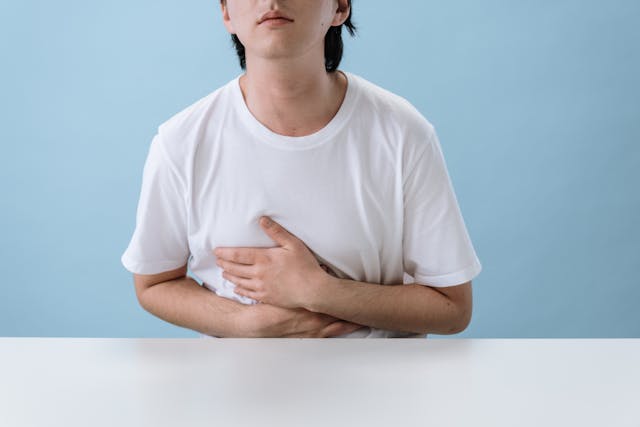
Your stomach is supposed to churn and squeeze to help digest your food. But for some, those stomach muscles don’t work like they’re supposed to. This causes a mysterious condition called gastroparesis – or stomach paralysis. Not being able to move food through your digestive tract properly can cause uncomfortable symptoms.
In this article, we’ll explore what goes wrong inside the stomach to cause this paralysis and some of the treatment options available to help get things moving again.
What Is Stomach Paralysis?
Stomach paralysis, medically termed gastroparesis, is a condition impacting the nerves and muscles within the stomach.
It disrupts normal muscle activity, known as peristalsis, which is responsible for moving food from the stomach into the small intestine. When the stomach muscles and nerves fail to function properly, food processing and emptying become impaired, leading to delays in the digestive process.
Individuals suffering from gastroparesis experience uncomfortable digestive symptoms and potential long-term consequences. They may encounter reduced appetite, difficulty meeting nutritional requirements, and challenges managing blood sugar levels.
Additionally, when food eventually exits the stomach, it might not fully pass through, leaving residual material. Over time, this can solidify into a hardened mass known as a bezoar.
What Causes Stomach Paralysis?
Damage to the vagus nerve, which regulates the muscles of the stomach, is the primary cause of gastroparesis. Conditions like diabetes, surgery near the stomach, certain infections, and autoimmune diseases can injure this nerve. When the vagus nerve is damaged, it impairs the normal muscular contractions of the stomach that churn and empty food.
One of the most common reasons is diabetes. Since elevated blood sugar levels over time can harm the stomach’s nerves and blood vessels, about one-third of diabetics get gastroparesis.
Surgeries on or near the stomach also pose a risk, as they may inadvertently damage the vagus nerve running through the area. Examples include fundoplication, gastrectomy, gastric bypass, and pancreatectomy.
Certain viral and bacterial infections have also been linked to gastroparesis. It’s unclear if these infections directly damage nerves or if immune cells intended to fight the infection mistakenly attack nerve cells. Autoimmune disorders, where the immune system attacks the body’s own tissues, may involve antibodies that target stomach nerves as well.
Some medications are known to affect stomach nerve signaling and muscle function, potentially causing temporary or prolonged gastroparesis. These include opioids, nicotine, marijuana, certain antidepressants, and blood pressure medications.
According to TruLaw, newer diabetes drugs such as amylin analogs and GLP-1 agonists have gained attention for reports of serious stomach side effects. Additionally, the weight loss drug Ozempic has also garnered attention for similar issues in some users.
Legal recourse is now being explored for individuals who suffered permanent stomach paralysis or other issues after taking Ozempic. Victims are filing lawsuits such as the Ozempic lawsuit against the manufacturers like Eli Lilly and Novo Nordisk.
As research continues, avoiding known risk factors and being aware of medication side effects may help prevent this challenging digestive disorder.
Managing Gastroparesis Through Diet and Lifestyle
When the stomach takes too slowly to release its contents, it is said to have gastroparesis. Gastritis may be chronic, meaning that it persists for a long time, based on the underlying cause. However, there are steps one can take to manage symptoms and control the condition.
Dietary changes are important for gastroparesis. Instead of 3 large meals, it is better to eat 6 small meals throughout the day. This puts less stress on the stomach at once and prevents feelings of fullness.
It is also best to choose liquid and low-fiber foods that are easier to digest, such as broths, applesauce, juices, and sports drinks. High-fat and high-fiber foods should be limited as they can slow digestion.
Ensuring adequate nutrition is crucial. A dietitian can help develop a meal plan with tasty, digestible options. Individuals should also avoid lying down for 2 hours after eating and consider light exercise like walking, which can aid the digestive process.
Medications may be prescribed to stimulate the stomach, reduce nausea, or help empty stomach contents. Some options include metoclopramide to induce contractions, erythromycin as an antibiotic and prokinetic, and antiemetics for nausea.
Other potential treatments include feeding tubes for nutritional support and botox injections to relax the pyloric valve. Additionally, options like electrical stimulation of stomach muscles, pyloromyotomy surgery, or gastric bypass may be considered for those with obesity or diabetes.
In very severe cases, IV nutrition may be needed temporarily. With lifestyle modifications and medical guidance, symptoms of gastroparesis can often be managed effectively.
FAQs
1. Is stomach paralysis permanent?
A: Occasionally, stomach paralysis stemming from short-term medication use or an acute infection resolves over time. However, for most individuals, gastroparesis is not curable, yet it can be effectively managed through treatment.
2. How is stomach paralysis diagnosed?
A: Gastric emptying scintigraphy stands as the primary diagnostic test for confirming stomach paralysis. This test involves consuming a special meal, sometimes accompanied by a specialized beverage, which is radiolabeled for visualization by a scanner.
3. What foods should be avoided with gastroparesis?
A: Raw and dry fruits (such as figs, apples, berries, coconuts as well, oranges, and persimmons), and raw vegetables (such as lettuce, skin of potatoes, Brussels sprouts, corn, and green beans) should be avoided. Also, stay away from whole-grain cereals, nuts, seeds, chunky nut butter, and popcorn.
While stomach paralysis can significantly impact one’s quality of life, ongoing research gives hope. By further unlocking the complex relationships between the nervous system, gut health, and disease, we move closer to more targeted treatments and prevention strategies. With multidisciplinary care and community support, many find ways of nourishing body and spirit despite life’s challenges.





